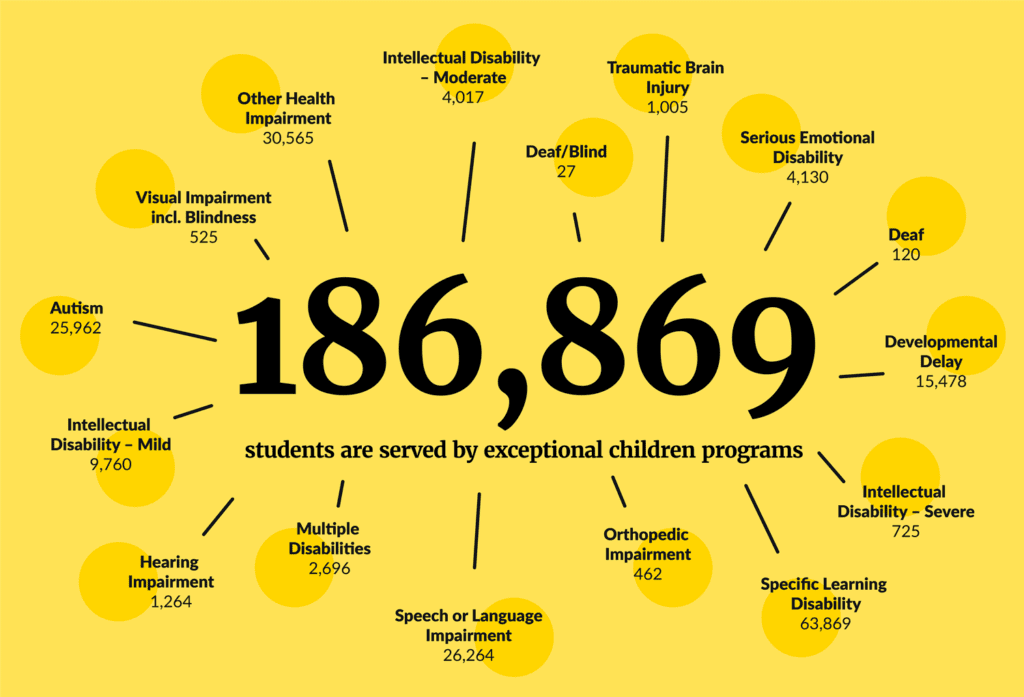
|
|
EdNC’s Chantal Brown, in partnership with the Education Writers Association Reporting Fellowship program, is conducting research on the educator workforce in North Carolina, with a specific lens on teachers working with students in special education.
Given the importance of the educator workforce serving exceptional children (EC), Brown and EdNC set out to determine how school and community resources aid or impede the recruitment, retention, and professional development of EC teachers.
From April 2 to April 19, 2024, EdNC conducted a survey of North Carolina educators, including sending it via email to all of the EC directors in the state’s 115 districts. The survey indicated it was intended for EC educators and administrators in North Carolina.
Of 227 respondents, 83% serve in public school districts and 17% serve in charter schools. The respondents from public school districts represented 51 of the state’s 115 districts. The respondent sample was racially diverse. Wayne County Public Schools, you win for highest response rate! Educators left us 680 comments.

“Seek to provide excellent working conditions through supportive administrators and competitive pay.”
— Survey response
Across all of the questions in the survey, here is what we learned would help EC teachers:
- Reduced caseloads;
- More time during the school day for paperwork;
- More time during the school day for meetings;
- Lower teacher-to-student ratios allowing for more individualization;
- Better training on how to manage behavior;
- More resources to support beginning teachers, leading to lower turnover and more stability in the workforce;
- Better training for teachers who come through alternate pathways;
- More support for veteran EC teachers to prevent burnout; and
- More support from counselors to address growing mental health needs of EC students.
Here are some of the questions we asked, some of the responses, and a few more takeaways.
Is the EC teacher pipeline healthy, adequate, or stressed?
When we asked educators whether their school’s EC teacher pipeline is healthy, adequate, or stressed, 75% indicated it was stressed with 23% indicating it was adequate or healthy.
In districts where the pipeline is perceived to be healthy, leadership is supportive, and educators feel like they are part of a team.
Where educators perceive the pipeline to be stressed, here are the kinds of concerns they shared:
We are stressed and do not feel effective.
We are so tired.
There are many learners who are borderline EC and the school is borderline unable to serve them.
Mid year replacements are a unicorn.
I never received training which would help me provide more structure for the class.
There are more intensive student needs across all classrooms, special education, and general education. Many teachers and instructional assistants don’t have the skills to deal with behaviors and other needs. Staff frequently quits when they find higher paying, less stressful jobs.
We have lots of meetings to schedule and the new ECATS system (see below for more) completely erases all previous forms requiring EC teachers to do triple the work to get ready for a meeting.
The workload is becoming more and more demanding plus dealing with student behaviors, staff meetings, department meetings, lack of instructional support personnel is all overwhelming and stressful.
Teachers do not have the adequate training to support the proper development of the craft.
How do districts recruit EC teachers?
Some districts have guidelines for the recruitment of EC teachers. We will be following up to find out more.
Districts use a variety of recruitment strategies, including online applications, job fairs, Indeed, school and district websites, building relationships with university education departments, word of mouth, social media, county websites, signing bonuses, recruiting out of state, stipends for hard-to-fill positions, and collaboration with staffing agencies.
Respondents also noted that “return to home” graduates, international educators, and military spouses are filling some gaps in the pipeline.
We need to lead college students to the profession.
Survey response
How do districts retain EC teachers?
An overwhelming number of respondents said it is getting harder to retain EC teachers.
It was clear from the responses that a great EC director goes a long way.
Respondents mentioned additional resources, mentors, buddy teachers, appreciation luncheons, words of affirmation, recognition, elimination of extra school duties, tuition reimbursement for those working on initial licensure or advanced degrees, instructional support, and incentives as being meanginful in retention.
IEP writers support teachers where there are vacancies to decrease paperwork loads. District leaders fill in for vacancies on a rotation.
Positive reputation for providing resources and support to schools and teachers, including mentoring, coaching, coordinator support, and Professional Learning Communities.
Certain businesses in the county offer discounts to all teachers.
My principal is good about getting the tools that we need to teach in each of the EC classrooms. She has an open door policy where we can discuss what is working and what is not.
For international teachers, supporting applications for citizenship.
We embed the EC teacher with the grade level team so they are more supported.
Make sure there is common planning.
Pay 10 months plus one week to recognize the extra paperwork over the summer months.
EC compliance specialists within the EC department who complete all initial student eligibility processes and all student re-evaluations to decrease the demands of EC paperwork.
District leaders attend difficult meetings to reduce the stresses or fears of a contentious outcome.
I currently stay in my position as an EC teacher because of the parent involvement.
Survey responses
Do school and/or community resources impacts the recruitment of EC teachers?
Resources impact the recruitment — and retention — of EC teachers, including federal, state, and local funding. But the cost of living in a county also matters.
Respondents also noted that if there are more affluent counties nearby, that can impact recruiting pressure locally, especially for hard-to-staff positions like EC teachers.
Do schools and districts offer professional development for EC teachers?
Despite the caseloads and paperwork requirements, 88% of respondents indicated that their school or district is offering professional development for EC teachers.
The professional development provided includes:
- Training for working with students with autism within the general education classroom;
- Mentors for beginning EC teachers;
- Monthly professional development after school;
- PLCs;
- Peer coaches;
- And working with other districts who have more experienced staff to provide training.
The EC department provides ongoing annual professional learning and professional development opportunities for all EC teachers. The professional development is aligned with the demographics of the students within their classrooms (extended content standards versus standard course of study). EC teachers are also provided opportunities to attend professional development outside of our district, which is offered through DPI and/or other agencies aligned with teaching students with disabilities. Compliance and program specialists are aligned with grade spans within our district to assist EC teachers who teach preschool, elementary, middle, or high school students.
Survey response
What else did we learn from our survey of EC educators?
Many educators noted their commitment to serving students:
Our EC team is talented and committed!
Our county has a hard-working EC workforce who collaborate well together to do whatever we can to help our students.
We are a caring bunch of professionals that want students to learn.
Particular pain points also were surfaced by the survey.
ECATS stands for Every Child Accountability & Tracking System. It was mentioned over and over in the comments left by respondents.
According to the N.C. Department of Public Instruction’s website, “The Special Education module is a case management and data analysis module that allows for the efficient capture of statewide Exceptional Children data. It offers NCDPI and PK-13 Educational Institutions a means to manage and analyze exceptional children data. ECATs eliminates redundant data collection, reduces paperwork, and focuses on ease of use of the Exceptional Children process for the user while still maintaining compliance to federal and state mandates.”
In our survey responses, educators perceive ECATS to be a pain point, which may indicate the need for additional training or support for EC teachers.
The survey also makes clear that the stress on EC teachers and the pipeline should not be underestimated.
The state of education is more fragile than the population knows, and the state of the EC workforce is teetering into a dangerously low level of qualified professionals. Federal funding, student loan forgiveness, stipends for EC teachers are just some of the sentiments that I have personally heard would be helpful in securing and re-building the EC workforce.
More EC teachers are desperately needed.
Veteran EC teachers need more support!
The need is DIRE. It is not a matter of having qualified applicants. We simply have NO licensed candidates AT ALL.
Burnout is real.
Survey responses
Thank you to the EC educators who participated in the survey. Your voice and your leadership matter.






